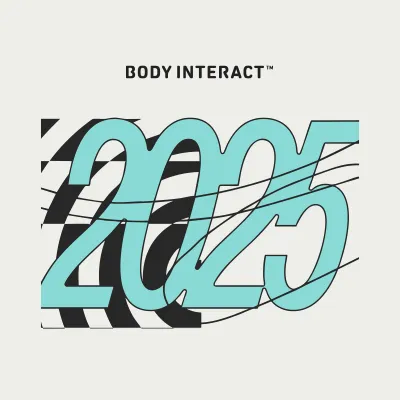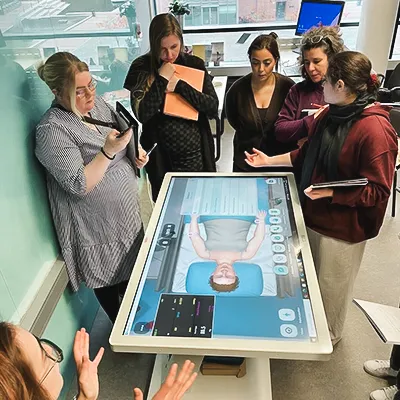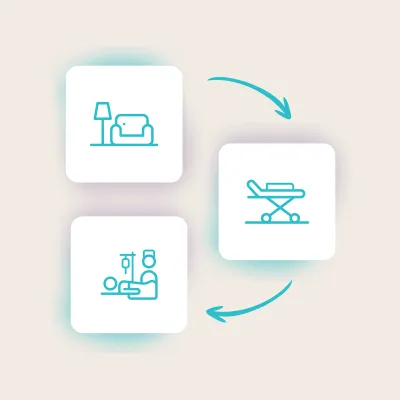Nursing across the lifespan, guided by Body Interact
“Nursing across the lifespan, guided by Body Interact”
(Bates et al, 2018)
Nursing is a profession that embraces people at every stage of life, from newborns to the elderly. Each developmental stage presents unique challenges, needs, and considerations (Hannum, 2023). It is essential to recognize that health and well-being evolve throughout the life course, and that nursing care must adapt accordingly. One framework highlights that “nurses touch people at every point of the lifespan” and argues for a life-course perspective that integrates early-life influences with later health outcomes.
Caring for Every Age, Every Need
In Body Interact virtual scenarios, nurses can interact with patients ranging from 6 months to 99 years old. This wide range of cases allows nursing students and professionals to:
- Recognize age-specific signs and symptoms
- Adapt communication and education strategies
- Practice age-appropriate interventions
- Develop empathy and confidence when caring for diverse populations
Whether managing a pediatric fever, educating a teenager about healthy habits, supporting an adult with chronic disease, or ensuring comfort for an older adult, learners can safely practice clinical reasoning in a risk-free environment.
Developing Competencies Across the Lifespan
Each Body Interact scenario is designed to promote critical nursing competencies, assessment, clinical judgment, patient education, teamwork, and ethical decision-making, while emphasizing the importance of context.
By engaging with patients at different stages of development, learners:
- Build a deeper understanding of physiological and psychosocial changes across the lifespan
- Strengthen decision-making based on developmental and cultural considerations
- Connect classroom knowledge with real-world nursing practice
Let’s explore…
Pediatrics (6 Months to 18 Years)

Caring for infants, children, and adolescents requires not only clinical accuracy but also a deep sense of empathy and adaptability. Pediatric nursing focuses on:
- Understanding developmental milestones and growth patterns
- Identifying early warning signs of illness
- Communicating effectively with both children and caregivers
- Providing education that supports prevention and healthy habits
With Body Interact, learners practice essential skills such as pediatric assessment, fever management, respiratory evaluation, and parent education, developing confidence in caring for the youngest patients.
Adults (19 to 64 Years)

Adult care represents the most significant portion of nursing practice, where professionals manage both acute and chronic conditions while promoting wellness and prevention. Scenarios in this age group allow nurses to:
- Strengthen assessment and clinical judgment in complex cases
- Prioritize care and make evidence-based decisions
- Support lifestyle changes and patient education
- Collaborate effectively with multidisciplinary teams
From managing chronic diseases like diabetes or asthma to responding to emergency situations, Body Interact helps learners refine their decision-making under realistic time pressure.
Elderly (65 to 99 Years)

Caring for older adults requires sensitivity to the physical, cognitive, and emotional changes that occur with the aging process. Geriatric nursing competencies include:
- Assessing functional abilities and risks (falls, dehydration, chronic diseases)
- Promoting comfort, independence, and quality of life
- Recognizing subtle signs of acute illness in the elderly
- Communicating with empathy and respect for dignity and life experience
Body Interact’s virtual elderly patients help learners practice compassionate, holistic care that balances medical management with human connection.
Want to discover our family of patients and experience the full journey of care?

References
Bates RA, Blair LM, Schlegel EC, McGovern CM, Nist MD, Sealschott S, Arcoleo K. Nursing Across the Lifespan: Implications of Lifecourse Theory for Nursing Research. J Pediatr Health Care. 2018 Jan-Feb;32(1):92-97. doi: 10.1016/j.pedhc.2017.07.006. Epub 2017 Sep 7. PMID: 28888348; PMCID: PMC5726902.
Hannum J. A lifespan approach: Tailoring nursing care to different developmental stages. J Intensive Crit Care Nurs. 2023;6(4):160
By Ana Santa – MSN, APRN
Editorial Manager









